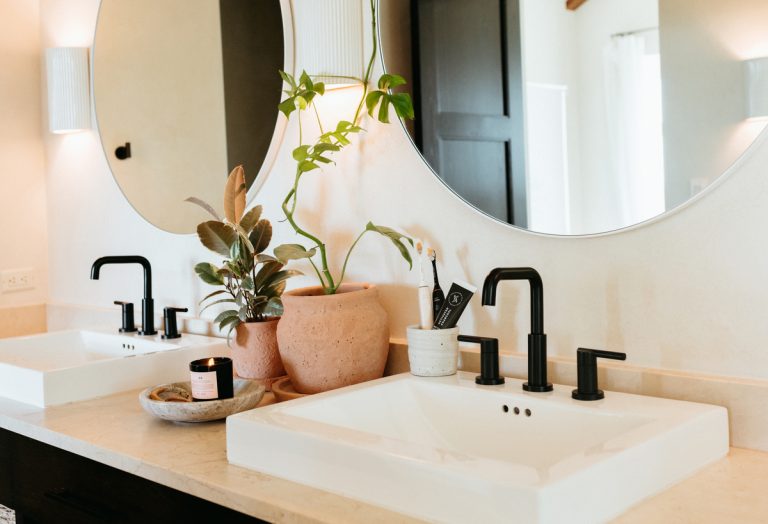
When you gotta go, you gotta go. Poo chat too taboo? Buckle up—we’re deep diving into all-things digestive flow. Squeamishness aside, pooping is vital. And no matter how hush-hush the topic, we all do it. Among many important functions, it allows our bodies to naturally detox, maintain hormonal balance, and keep gut health in check. But have you ever wondered if your poops are normal? And what happens if you’re not having a daily bowel movement? We’re leaving nothing unscathed: how often should you poop, why inconsistent pooping can impact your overall health, and more. Time to uncover the surprising secrets from the porcelain throne.
Featured image by Michelle Nash.
In this article
- Why Daily Poops Are Important
- How often should you be pooping?
- Are you pooping too much?
- What does a normal poop look like?
- 6 Diet And Lifestyle Tips To Encourage Normal Poops
- A Morning Routine For Ideal Elimination
- What happens to your hormones if you aren't pooping daily?
- The Correlation Between Pooping and Caffeine

Why Daily Poops Are Important
With wellness in mind, maintaining a daily poop routine is crucial. In fact, our bodies are designed to eliminate waste efficiently—and a regular bowel movement is a vital part of this process! When we don’t poop daily, toxins and byproducts linger. And this leads to a buildup of waste. In turn, this affects our long-term health. Therefore, regular (read: daily!) elimination encourages homeostasis. Additionally, daily poops help regulate hormones! More on this, below. Beyond physical benefits, the psychological satisfaction of a regular poop can’t be underestimated. IYKYK.
How often should you be pooping?
This varies. Generally speaking, it’s recommended to have a regular poop pattern of at least once a day. However, what truly matters is the consistency and ease of elimination. In other words, you may have slightly fewer bowel movements than your partner or bestie, but as long as you experience comfortable and complete evacuation (this is key!), you’re good to go.
On the other hand, you may have more frequent bowel movements. And this can still be considered normal—so long as it’s your regular pattern and not accompanied by any discomfort or urgency.

Are you pooping too much?
While it’s important to maintain regular bowel movements, there can be instances where pooping too frequently might be problematic. Ultimately, the definition of “too much” pooping is nuanced. That said, having more than three bowel movements per day could be considered excessive. Additionally, frequent, loose, or watery stools may indicate a condition such as diarrhea, which can lead to conditions like dehydration and nutrient imbalance. If these ring a bell, begin paying attention to other accompanying symptoms: abdominal pain, cramping, or blood in the stool. These could be signs of an underlying digestive issue.
If you have concerns about your bowel habits, chat with your healthcare professional for personalized guidance.
What does a normal poop look like?
Yes, we’re going there. In general, a healthy bowel movement is typically brown in color, indicating the presence of bile pigments from the liver. The shape should be well-formed and resemble a soft snake. In essence, this suggests proper transit time through the digestive tract. Normal poops should be easy to pass. Think: minimal strain. It should also have a moderate level of moisture, neither too dry nor too watery. Additionally, a normal poop should not have an overwhelming or foul odor. All of that said, everyone’s bowel movements can differ slightly. What is typical for you can provide valuable insights into your digestive health.

6 Diet And Lifestyle Tips To Encourage Normal Poops
Interested to know what supports regular and effortless pooping? These are the research-backed tips we swear by:
1. Increase fiber intake
Include fiber-rich foods in your diet, such as whole grains, fruits, vegetables, legumes, and nuts. Fiber adds bulk to the stool, promoting regularity.
2. Stay hydrated
Drinking an adequate amount of water throughout the day is very important for digestive health. Sufficient hydration helps soften the stool and facilitates smooth bowel movements. For extra support, try sipping on a digestive-friendly tea!
3. Exercise regularly
Any kind of exercise works! That said, research shows that cardio is the simplest form of physical activity to help avoid constipation. Regardless, movement—in general—helps stimulate the muscles in your digestive system, aiding in proper bowel function.
4. Establish a routine
When possible, establish a consistent daily routine for meals and bathroom visits. Regular meal times and a predictable schedule can help regulate your digestive system and promote regular bowel movements.
5. Practice relaxation techniques
This goes without saying, but chronic stress can affect digestion. Incorporate stress-reducing activities like deep breathing, meditation, or yoga to promote a healthy gut-brain connection.
6. Limit ultra-processed foods
Ultra-processed foods are often low in fiber and high in unhealthy fats, which can contribute to constipation. Aim for a diet rich in whole, unprocessed foods for better digestive health.

A Morning Routine For Ideal Elimination
Here at Camille Styles, we love a morning routine. It’s practically written in our ethos. No matter what your current morning routine looks like, what if you started cultivating habits with pooping in mind? Trust us, it’s not that outlandish!
Ultimately, what you do—shortly after waking—can set the stage for a proper poo (and a great start to your day). Here’s an ideal morning routine that focuses on promoting healthy digestion and regular bowel movements:
- Wake up and hydrate. Begin your day by drinking a glass of warm water with lemon, fresh ginger, and a pinch of high-quality salt. This helps hydrate your body and kick-start your digestive system.
- Gentle stretches or exercise. Engage in light stretching, yoga, or gentle exercises like walking or jogging. Physical activity can stimulate bowel movements by promoting intestinal muscle contractions.
- Eat a fiber-rich breakfast. Enjoy a satiating breakfast that includes high-fiber foods—eggs scrambled with veggies, a bowl of Greek yogurt with nuts, seeds, and berries, nutrient-dense oatmeal, or a balanced smoothie with leafy greens.
- Relaxation time. Set aside a few minutes for relaxation techniques such as deep breathing, meditation, or journaling. Stress can impact digestion, so taking time to unwind can support healthy bowel movements.
- Bathroom time. Listen to your body’s cues! Head to the bathroom when you feel the urge to poop. Avoid delaying or rushing the process.

What happens to your hormones if you aren’t pooping daily?
To set the stage, our bowels play a foundational role in eliminating waste, including excess hormones. If waste products aren’t being detoxed, they can accumulate in the body. In turn, disrupting hormone health. Estrogen, specifically, is affected by constipation. When estrogen is metabolized by the liver, it’s typically excreted through the bile into the intestines. But if the bowels are not moving regularly, estrogen dominance can come knocking at the door. Signs of estrogen dominance include digestive issues (it’s a two-way street!), fatigue, low sex drive, breast cysts, hair loss, and more. Along with diet and lifestyle habits that support happy hormones, make sure you’re pooping—regularly.

The Correlation Between Pooping and Caffeine
Last but not least, let’s talk about caffeine. Yes, drinking coffee (hot or cold brew!) can often help encourage bowel movements. Coffee has a stimulating effect on the digestive system, particularly due to its caffeine content. Caffeine acts as a natural laxative, promoting contractions in the colon and stimulating the urge to go. This effect can be beneficial if you experience occasional constipation or need assistance with regularity. But, it’s not best to rely on coffee to move things along.
Keep in mind that excessive consumption of coffee or caffeine can lead to dehydration, which can worsen constipation. Therefore, it’s advisable to drink coffee in moderation and ensure you stay adequately hydrated throughout the day.
The post How Often Should You Poop? A Nutritionist Answers All the Questions You’ve Been Too Shy to Ask appeared first on Camille Styles.


0 Comments